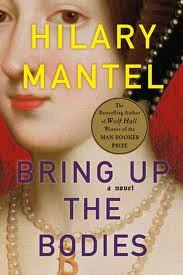 |
| Amazon |
 |
'Jane,' he says, 'if the time comes when you wish to disburden your conscience, do not go to a priest, come to me. The priest will give you a penance, but I will give you a reward.'"
After the jump, my review.
Grade: A-
This is the second volume in Hilary Mantel's trilogy about Thomas Cromwell, the trusted adviser to King Henry VIII. Like its predecessor, "Wolf Hall," this novel is full of smart dialog and court intrigue. Like "Wolf Hall," it features many finely drawn details of life in 16th century England.
The first novel followed the rise of Cromwell, a blacksmith's son, to his place as Master Secretary, with emphasis on his role in disposing of Katherine and installing Anne Boleyn in her place as Queen of England. This novel traces Cromwell's role in Anne's downfall. That leaves a third novel to come tracing Cromwell's own end.
Cromwell, who is usually painted as villain, is shown here to be a complex character. He is competent in his job, ruthless yet not cruel, without friend or ally, a loyal servant of his King, who is his ultimate source of power and defense against his enemies at court. Cromwell takes a very practical approach to his service to the King. His duty is to Henry, not to justice or fairness or truth. When Henry wants to be rid of Anne and needs to find men guilty of adultery with her to justify that, Cromwell accommodates him. The Boleyns and Seymours and Howards who are constantly contesting and scheming to gain favor at each other's expense provide a rich pool of potential scapegoats. Cromwell does his job, not out of malice, but out of business necessity. He would have made a successful CEO.
If there's a criticism of the novel, it's that as richly, believably drawn Thomas Cromwell himself is, many of the characters (real historical figures) come across as foolhardy or foolish or both. The Tower, the rack, the scaffold are real, but the victims feel immune until too late.
The warnings I issued about the first book apply here, too. It's long and it's full of characters and relationships that are hard to keep straight unless you have some prior familiarity with Tudor history. A lot of the story unfolds in conversation, not action. A lot of the conversation happens inside of Cromwell's mind. I loved it, but other readers may find it dense.

1 comment:
I think it may be that some in the royal court DO tend to think themselves rather immune from many of the devices used, not unlike the characters you mention.
The following link to 'DelanceyPlace' archives gives an example of what I'm talking about - albeit from the Russian royal court rather than that of Great Britain.
http://www.delanceyplace.com/view_sresults.php?2000
Post a Comment